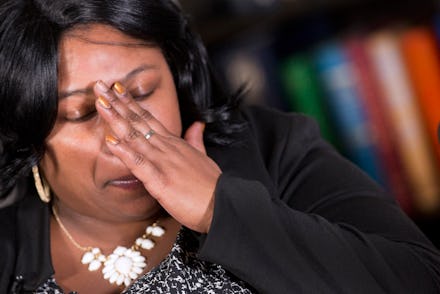The Other Devastating Effect of Police Abuse That Deserves Our Attention

In November 2014, 12-year-old Tamir Rice was playing with a toy gun in a park on the west side of Cleveland when Officer Timothy Loehmann, mistaking the toy for a real weapon, shot him twice. It's been 165 days since his death and the boy has yet to be buried, according to a court motion filed Monday by his family.
The shooting has "shattered the life of the Rice family," the motion states. For one thing, they have been unable to properly grieve and hold a funeral for Rice, because they are not yet sure if an additional medical examination will be required as they proceed with a lawsuit against Loehmann, Officer Frank Garmback (who was also present at the time of the shooting) and the city of Cleveland. Rice's mother, Samaria Rice, also temporarily moved into a homeless shelter because she "could no longer live next door to the killing field of her son."
The story of Rice's family is a cruel reminder that pain does not subside when the protests end and news crews leave. Families still grieve. And some live in the same neighborhoods where their loved ones were killed.
Internal and grand jury investigations can take several months. This period of time can be difficult for families that must navigate drawn out court cases while their deceased are memorialized in the streets and the last few violent scenes of their loved one's lives are replayed in the media. Time can feel brutal as families await justice.
The Rice family is not alone in experiencing the type of pain that resurfaces during and after investigations and court proceedings. The grand jury investigation surrounding the death of 18-year-old Michael Brown in Ferguson, Missouri, in August 2014, for example, lasted three months before Officer Darren Wilson was acquitted of all charges that November. Lesley McSpadden, Brown's mother, said the nights following the acquittal as "sleepless, very hard, heartbreaking and unbelievable," according to MSNBC. It would be another four months before Wilson was cleared of civil rights violations by the Department of Justice.
The family of Rekia Boyd, the 22-year-old fatally shot by Chicago Det. Dante Servin in March 2012, had to wait until November 2013 for involuntary manslaughter charges to be brought against Servin. Two years later, Servin was cleared of all charges.
Three years after Boyd's death, her brother Martinez Sutton remains devastated. "I hurt every day. I just wish that I could hold my sister just one time," he told a crowd at rally in March in Chicago, according to the Chicago Tribune.
It's clear the consequences of police abuse go beyond its direct victims, and negative mental health effects can manifest in the communities where these victims once lived. These include the emotional toll endured by families and friends awaiting legal process, the trauma of being bombarded with images of black individuals killed by police and the stress and anxiety experienced by activists organizing in response to those deaths.
"The immediate or more acute violence endured by those of us on the frontline in Ferguson is compounded by the daily trauma of living in a world that refuses to acknowledge that #BlackLivesMatter," Ferguson activist Ashley Yates told Mic.
Indeed, the blood-stained streets in the neighborhood where Brown's body laid for four hours is more than a memorial site — it is also home to his family and friends, an ever-present reminder of the encounter that ended his life. Similarly, the park where Rice played is not only the scenic backdrop of a widely watched video chronicling a shooting that killed a child — it is also a reminder to a mother that her son is dead.
The pain and exhaustion of dealing with the aftereffects of police brutality is just as violent as the gunshots used to kill unarmed civilians. Justice should not have to arrive at the expense of people's mental and emotional health. Justice might look like arrested officers, but justice is also evidenced when communities disproportionately impacted by police abuse are healed.
As the Rev. Osagyefo Sekou of the Fellowship of Reconciliation, which has been active in the fight against police brutality across the country, told Mic, "The struggle must hold space for broken people trying to make the world whole."
Correction: May 7, 2015